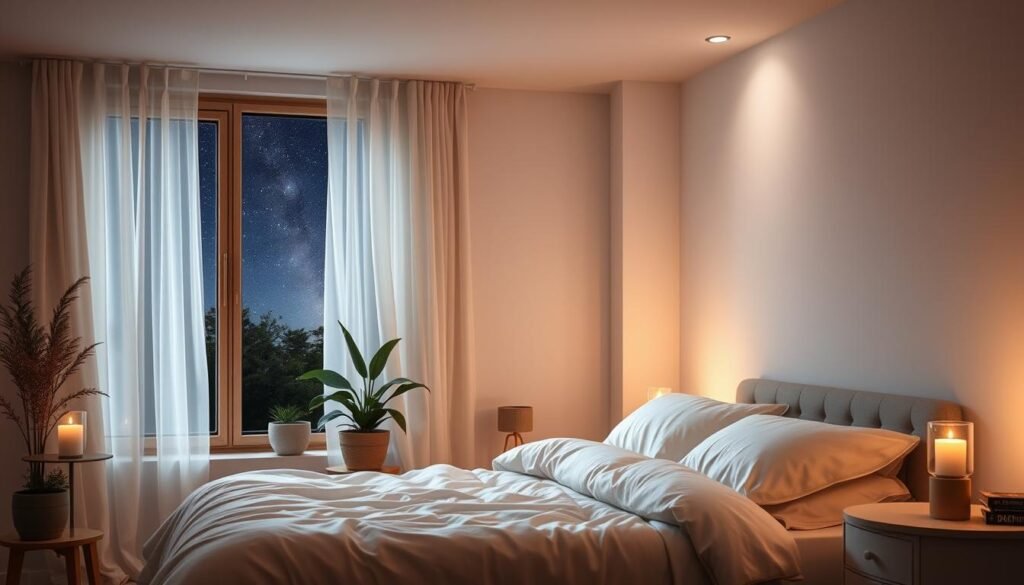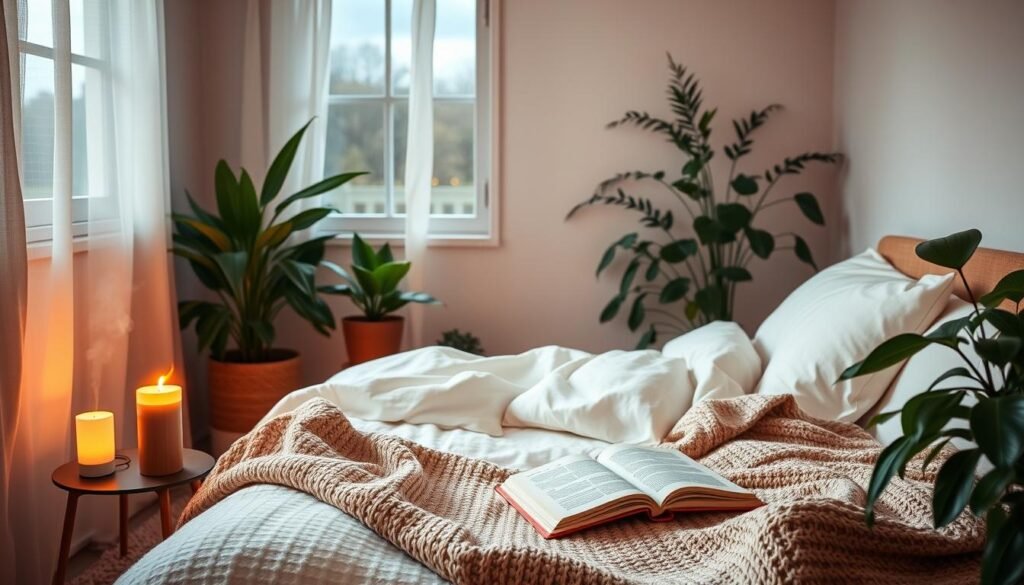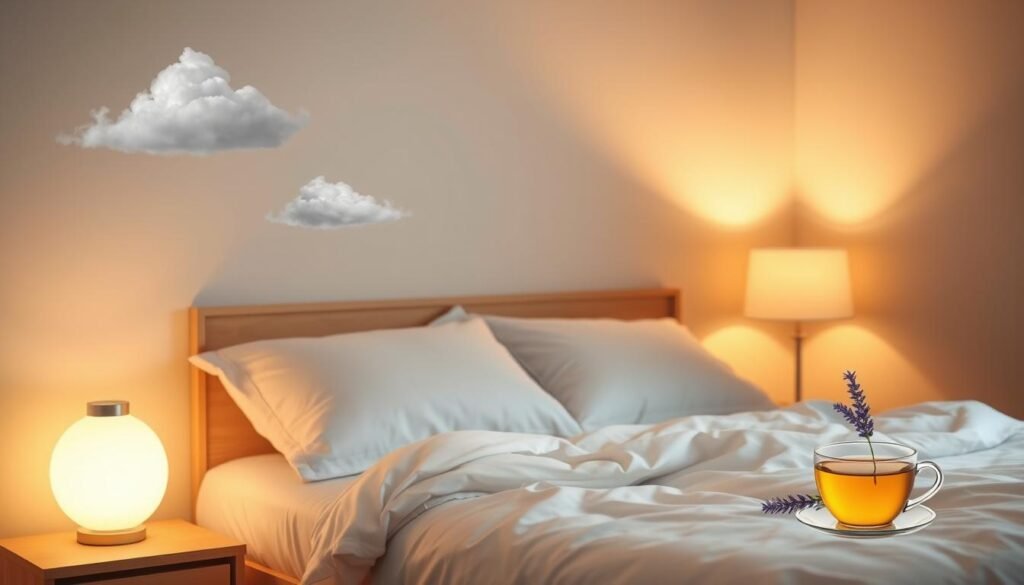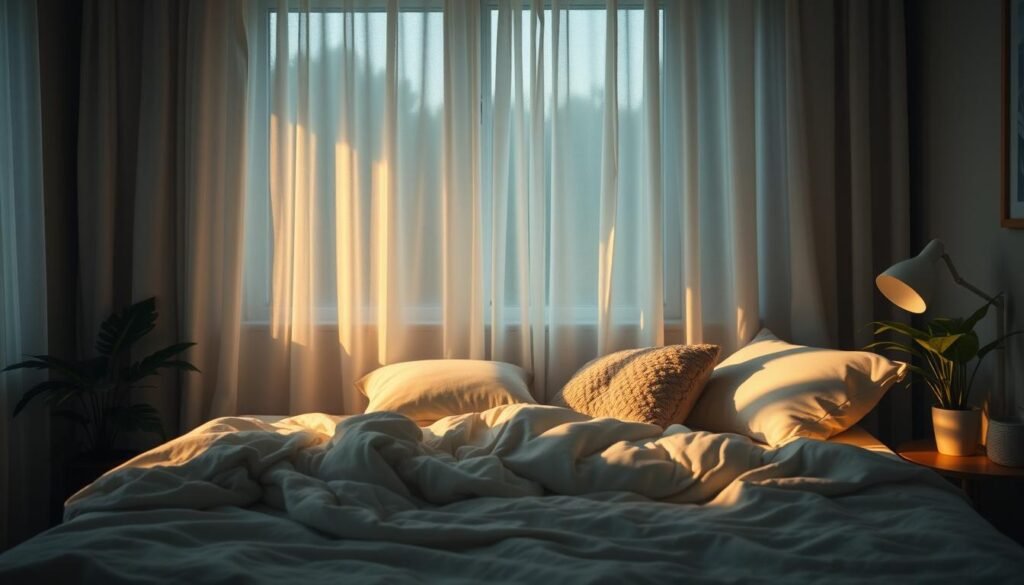Many of us lie in bed, wide awake, and wonder how to stop our brains from racing. This is a common problem that affects many. It’s key to tackle it to keep our health and well-being in check. Learning sleep techniques and brain relaxation methods can help us solve this issue.
Research shows that using electronic devices an hour before bed can lead to sleep problems. This makes it clear why we should avoid screens before bed. Instead, we should focus on relaxation techniques to calm our minds. By adding sleep techniques like progressive muscle relaxation and breathing exercises to our bedtime routine, we can sleep better and wake up feeling refreshed.
It’s important to understand the science behind sleep and relaxation to tackle our sleep worries. By learning how to shut off our brains to sleep, we can boost our health and well-being. In this guide, we’ll look at different sleep techniques and brain relaxation methods to help you get a good night’s sleep.
- Learning effective sleep techniques and brain relaxation methods can help us overcome sleep issues.
- Avoiding electronic devices before bedtime is essential for improving sleep quality.
- Incorporating relaxation techniques, such as progressive muscle relaxation and breathing exercises, into our bedtime routine can help us fall asleep faster.
- Understanding the science behind sleep and relaxation is key to solving our sleep concerns.
- Practicing consistent sleep and wake schedules contributes positively to healthy sleep hygiene practices.
- Limiting caffeine, nicotine, and alcohol intake is recommended for better sleep quality.
Understanding Why Your Brain Won't Shut Off at Night
Getting a good night’s sleep means having a quiet mind. But for many, quieting the mind for sleep is hard. Studies show that about 30% of adults deal with insomnia each year. More than 50% say stress and racing thoughts keep them awake.
Stress and anxiety often make our minds race. Sleep enhancement tips suggest using relaxation methods like deep breathing or sleep meditation practices. Also, staying away from screens before bed helps. This is because screens can lower melatonin levels and mess with sleep.
Here are some ways to calm your mind:
- Try mindfulness and meditation to lower stress and anxiety
- Stay away from caffeine and screens at night
- Do relaxing things, like reading or listening to calm music
By using these tips, we can sleep better and feel better in the morning. Good sleep is key for our health and happiness. By trying sleep meditation practices and other relaxation methods, we can start living a healthier life.
Improving sleep quality starts with quick mind-calming techniques before bed. Writing down tasks or worries can clear your mind. This simple act helps you relax and get ready for sleep.
Practicing good sleep hygiene is also key. This includes keeping a regular sleep schedule and creating a calm sleep space. Avoiding screens before bed helps too. These habits train your body to sleep better.
Here are some quick ways to calm your mind before bed:
- Deep breathing exercises to slow down your heart rate and promote relaxation
- Progressive muscle relaxation to release tension and calm your muscles
- Visualization techniques to imagine calming scenes and distract yourself from stressful thoughts
Adding these techniques to your bedtime routine can greatly improve your sleep. It’s about finding what works for you and sticking to it. This way, you’ll wake up feeling refreshed and ready to go.
| Technique | Description |
|---|---|
| Deep Breathing | Slow, deliberate breaths to calm the mind and body |
| Progressive Muscle Relaxation | Tensing and relaxing muscle groups to release tension |
| Visualization | Imagining calming scenes to distract from stressful thoughts |
How to Shut Off the Brain to Sleep: Essential Methods
To shut off brain for sleep, knowing relaxation techniques is key. Progressive muscle relaxation is a top method. It involves tensing and relaxing muscles to reduce tension and calm the mind.
Breathing exercises are also vital. They help quiet the mind and lower stress. Deep, slow breaths can distract from thoughts and promote relaxation. As the third source notes, focusing on breath can separate you from racing thoughts.
Visualization is another effective method. It involves imagining a peaceful place to distract from stress. This can help calm the mind and make it easier to how to shut off the brain to sleep. Regular practice of these methods can improve sleep and reduce stress.
Creating Your Perfect Sleep Environment
A perfect sleep environment is key for a good night’s sleep. We must think about light, temperature, and noise. To quiet the mind for sleep, make your room sleep-friendly. Keep it cool, around 65 degrees Fahrenheit, and use blackout curtains to block light.
Minimizing distractions is also vital. Turn off devices an hour before bed. This turns off the brain for sleep by reducing blue light and signaling sleep time. Use white noise machines or earplugs to block out noise.
Here are more tips for a perfect sleep environment:
- Use a comfortable mattress and pillows
- Keep the room clean and dust-free
- Use a lavender scent to promote relaxation
- Wash sheets and pillowcases regularly
By following these tips, you can create a sleep space that relaxes you. A good sleep environment is key for health. It’s worth the effort to get it right.

| Factor | Importance | Tips |
|---|---|---|
| Light | High | Use blackout curtains, dim red lights |
| Temperature | High | Keep room at 65 degrees Fahrenheit |
| Noise | High | Use earplugs, white noise machine |
The Power of Pre-Sleep Rituals
Exploring ways to better sleep quality leads us to pre-sleep rituals. These can include digital detox and calming activities. They help shut down the mind for better sleep. By calming the brain, sleep can be greatly improved.
Bedtime rituals can lower anxiety, a big sleep barrier. Activities like meditation, yoga, and reading relax us. Doing these for 30 to 60 minutes before bed aligns with our body’s natural rhythms.
- Consuming warm beverages like chamomile tea
- Practicing gentle stretches or yoga
- Listening to calming music or nature sounds
- Reading a book with a simple, uneventful plot
- Writing in a journal to sort thoughts and feelings
Incorporating these rituals into your night can make sleep better. Consistency is key. Find what works for you and make it a daily part of your routine.
| Ritual | Benefits |
|---|---|
| Meditation | Reduces anxiety, improves sleep quality |
| Yoga | Relaxes the body, enhances sleep |
| Reading | Distracts from stressful thoughts, promotes relaxation |
Mindfulness and Meditation Practices for Better Sleep
We know how key sleep preparation tips and sleep-inducing strategies are for a good night’s rest. Adding mindfulness and meditation to our daily life can help. These practices help quiet our minds, leading to better sleep.
Mindfulness and meditation can lower stress and anxiety. They also boost melatonin and improve our mood. Simple activities like deep breathing or guided meditation can be very helpful. We can also find new practices on mindfulness apps or online.
- Begin with short, daily meditation sessions, focusing on deep breathing or guided meditation
- Use mindfulness apps or digital platforms to find new practices and techniques
- Add physical activities like yoga or qigong to relax and reduce stress
Meditation has been calming the body and mind for centuries. Studies show it helps perfectionists stop judging themselves. It also aids in treating smoking, pain, addictive disorders, and depression.
By adding mindfulness and meditation to our daily routine, we can improve our sleep. These practices help us prepare for sleep better. Remember, it takes time to see the full benefits of mindfulness and meditation for sleep.
Natural Remedies and Supplements for Mental Relaxation
Natural remedies and supplements can help you relax your mind before bed. They are key to getting a good night’s sleep. Herbal solutions, essential oils, and what we eat are important. For example, valerian root is known to improve sleep quality and how quickly you fall asleep.
Here are some natural ways to relax your mind for sleep:
- Valerian root: 300-600 mg can improve sleep quality
- Melatonin: 3-10 mg can reduce sleep latency and increase total sleep time
- Magnesium: up to 350 mg per day can help reduce the time it takes to fall asleep
- Aromatherapy: lavender and passionflower can improve sleep quality
Keeping a gratitude journal is also helpful. Write down three to five things you’re thankful for each night. This can help you relax and get ready for sleep. By adding these natural remedies and supplements to your bedtime routine, you can sleep better and feel better overall.
Physical Exercise: Timing and Types for Optimal Sleep
Regular exercise is key for health and can help improve sleep. It helps us relax our minds and lower stress, making it easier to sleep. Here are some sleep tips for exercise and sleep.
Studies show that moderate exercise, like walking or cycling, boosts slow wave sleep. This is important for deep sleep and feeling refreshed. Exercising 1 to 2 hours before bed helps by letting endorphins fade. Finding the right balance between exercise and sleep is vital for relaxation.
Some exercises that can help sleep quality include:
- Yoga: helps to reduce stress and promote relaxation
- Power lifting: can help increase energy levels and improve mood
- Brisk walking: can help clear the mind and promote brain relaxation
By adding exercise to our daily routine and following these sleep tips, we can sleep better. Always listen to your body and find the right balance for the best sleep and quieting the mind.
Managing Stress and Anxiety Before Bedtime
Getting ready for sleep means managing stress and anxiety. This helps us have a good night’s rest. Techniques like sleep meditation and sleep preparation routines are key. They calm our brain and body, leading to better sleep and feeling refreshed in the morning.
Relaxation techniques, like deep breathing or progressive muscle relaxation, are great for stress. They lower anxiety and help us relax. Also, sleep meditation can lessen insomnia and boost sleep quality.
Creating a consistent sleep preparation routine is another good idea. This can include reading, journaling, or a warm bath. It tells our brain it’s time to sleep, making it easier to fall and stay asleep. Adding these habits to our daily life can greatly improve our sleep and make mornings better.
The Role of Light Exposure in Sleep Regulation
Light exposure is key to our sleep patterns. It’s important to know how it affects our bedtime routine. The supersuprachiasmatic nucleus (SCN) in our brain gets light info from our eyes. This helps control our sleep and wake times.
It’s vital to have a regular sleep schedule and a sleep-friendly space. This helps our body get ready for sleep.
One great sleep hack is to cut down on blue light in the evening. Blue light can stop melatonin production, making it tough to sleep. Blue light glasses or apps can help. Also, deep breathing or meditation can relaxmymind and get us ready for sleep.
Here are some tips for better sleep:
- Being in natural light during the day helps our body clock
- Stay away from screens and electronic devices before bed
- Use dim red lights instead of bright white ones in the evening
By knowing how light affects our sleep and using these sleep hacks, we can sleep better. We’ll wake up feeling great. Make sure to relaxmymind and create a sleep-friendly space for a good night’s rest.
Developing a Consistent Sleep Schedule
Creating a regular sleep schedule is key to better sleep. It helps our body’s internal clock work better. We do this by going to bed and waking up at the same time every day, including weekends.
To make a sleep schedule, we need more than just a bedtime. We also need brain relaxation methods and sleep techniques. These help our minds and bodies relax before sleep. Avoiding daytime naps and having a calming bedtime routine are good tips.
Here are some important steps to make a consistent sleep schedule:
- Set a regular bedtime and wake-up time, including on weekends
- Avoid napping during the day, specially in the afternoon
- Establish a relaxing bedtime routine to signal to your brain that it’s time to sleep
- Get some morning sunlight exposure to help regulate your circadian rhythm
By using these sleep techniques and brain relaxation methods, we can sleep better. This makes us feel refreshed and ready for the day. Remember, sticking to your schedule is important, even on weekends and days off.
| Strategy | Benefits |
|---|---|
| Set a regular bedtime and wake-up time | Regulates circadian rhythm, improves sleep quality |
| Avoid napping during the day | Prevents sleep inertia, improves nighttime sleep quality |
| Establish a relaxing bedtime routine | Signals to the brain that it’s time to sleep, reduces stress and anxiety |
Advanced Sleep Enhancement Techniques
Getting better sleep is key for feeling good. Mental strategies can really help. One method is the wake-back-to-bed technique. You set an alarm to wake up, stay awake a bit, then go back to sleep.
This can boost your chances of dreaming vividly and improve sleep. Another method is sleep stage manipulation. This uses meditation or deep breathing to control sleep stages.
Sleep hygiene practices like a regular sleep schedule and a calm sleep space also help. These practices can lead to better sleep and more deep sleep.
Using a sleep tracker can help you see how to sleep better. Techniques like progressive muscle relaxation and body scan meditation can also help. They reduce stress and make it easier to fall asleep.

Remember, everyone is different. What works for one might not work for another. So, try different techniques to find what works for you.
By mixing mental strategies with sleep hygiene, you can improve your sleep. This approach can make you feel rested and refreshed every morning.
When to Seek Professional Help
Many of us struggle with how to shut off the brain to sleep. But when does it become a serious problem? If you can’t sleep at night because your mind won’t stop, it’s time to get help. About 58% of adults have trouble falling asleep because of a racing mind at least once a week.
Looking for signs that you need a sleep specialist? These include not being able to sleep, feeling tired during the day, and trouble focusing. If you’re seeing these signs, getting help is key to avoid health problems later on.
Signs of Serious Sleep Issues
- Persistent insomnia
- Daytime fatigue
- Difficulty concentrating
Types of Sleep Specialists
Looking for professional help? You can talk to a sleep specialist like a psychologist or psychiatrist. They can teach you brain shutdown techniques for sleep. They might also suggest cognitive behavioral therapy (CBT) for insomnia, which really works.
Remember, asking for help is the first step to better sleep and health. By learning how to shut off the brain to sleep and fixing sleep problems, you’ll wake up feeling great and ready for the day.
Common Mistakes to Avoid When Trying to Sleep
We often don’t realize how important sleep hygiene is. It’s key to our well-being. To get better sleep, we must know the common mistakes that can mess with our sleep. Drinking caffeine and using electronics before bed can make it hard to quiet the mind for sleep. Also, not setting aside time to worry outside of bed can help reduce anxiety and improve sleep.
Some other mistakes to avoid include:
- Screen time within an hour of bedtime can stop melatonin production and mess with sleep patterns
- Not sticking to a regular sleep schedule can lower sleep quality
- Not making the bedroom a sleep-friendly place, like keeping it cool, can also affect sleep
Knowing these mistakes and avoiding them can help us sleep better and stay healthy. It’s important to find the right methods to turn off the brain for sleep and tips for silencing the brain to sleep that fit our needs. This could be through relaxation, setting a sleep schedule, or making our bedroom sleep-friendly.
| Mistake | Effect on Sleep |
|---|---|
| Consuming caffeine before bedtime | Disrupts sleep patterns and reduces sleep quality |
| Engaging in screen time before bedtime | Hinders melatonin production and disrupts sleep patterns |
| Not maintaining a consistent sleep schedule | Affects the quality of sleep and overall health |
Conclusion: Your Path to Peaceful Sleep
Shutting off the brain for better sleep is key to good health. By using the tips from this guide, we can improve our sleep. This leads to more rest, better productivity, and a higher quality of life.
Everyone’s sleep needs are different. So, it’s important to try out various methods to find what works for you. Whether it’s relaxation exercises, a cozy sleep space, or professional help, keep trying until you find your way to shutting down the mind for better sleep.
Remember, techniques to calm the brain for better sleep can change your life. By focusing on quality sleep and improving sleep quality, you’ll feel more energetic and mentally sharp. You’ll also enjoy better physical and mental health.
Take this chance to control your sleep and find peace at night. With the right effort and approach, you can develop sleep habits that will benefit you now and in the future.

Join 30,000+ subscribers for exclusive access to our Relaxing tips!
FAQ
How can I shut off my brain to sleep better?
To shut off your brain and sleep better, try progressive muscle relaxation. You can also do breathing exercises, visualization, and create a peaceful sleep space.
What are the common triggers for an overactive mind at night?
Stress, anxiety, and blue light from screens can keep your mind racing at night. These factors make it hard to fall asleep.
What are some quick techniques to calm the mind before bed?
Quick ways to calm your mind include muscle relaxation and deep breathing. Writing down your worries before bed can also help clear your mind.
What are the essential methods for shutting off the brain to sleep?
Key methods for quieting your mind include muscle relaxation, breathing exercises, and visualization. These techniques help relax and prepare for sleep.
How can I create the perfect sleep environment?
For the perfect sleep space, control light, temperature, and noise. Keep devices out of your bedroom.
What are some effective pre-sleep rituals for better sleep?
Good pre-sleep rituals include a digital detox and calming activities like reading or a warm bath. Timing your wind-down routine is also important.
How can mindfulness and meditation practices improve my sleep?
Mindfulness and meditation, like guided meditation and deep breathing, quiet the mind. They promote relaxation and better sleep.
What natural remedies and supplements can help with mental relaxation?
Natural remedies like herbal solutions, essential oils, and certain foods can relax the mind. They help improve sleep quality.
How can physical exercise impact my sleep?
Exercise, like yoga or walking, can reduce tension and improve sleep. But, the timing and type of exercise matter.
How can I manage stress and anxiety before bedtime?
To manage stress and anxiety before bed, try journaling or scheduling a “worry time.” Cognitive restructuring techniques also help.
How does light exposure affect my sleep?
Blue light from screens can disrupt sleep by lowering melatonin levels. Minimize light before bed for better sleep.
Why is it important to have a consistent sleep schedule?
A consistent sleep schedule is key for good sleep hygiene. Stick to a regular bedtime and wake-up time, even on weekends.
What are some advanced sleep enhancement techniques?
Advanced techniques include sleep stage manipulation and the wake-back-to-bed method. They can enhance sleep quality and quantity.
When should I seek professional help for sleep issues?
If sleep problems persist, like trouble falling or staying asleep, see a sleep specialist. They can help with underlying sleep disorders.
What are some common mistakes to avoid when trying to sleep?
Avoid caffeine and electronic devices close to bedtime. They can disrupt your natural sleep-wake cycle.





Pingback: "How to sleep in 2 minutes like Nobita? The Ultimate Sleep H
Pingback: "Can we sleep in 2 minutes how?"
Pingback: Why do girls like big eyes?
Pingback: Does Sleeping With Someone You Love Make You Fall Asleep Faster?
Pingback: How To Relax My Brain? How To Relax My Brain? Essential T...
Pingback: What Are Attractive Eyes In Men? What Are Attractive Eyes In